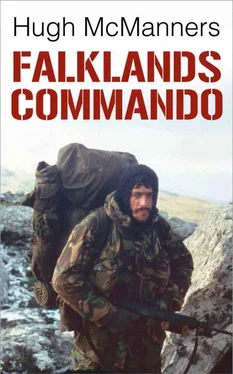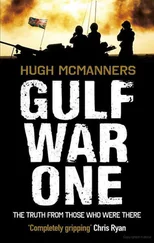Hugh McManners - Falklands Commando
Здесь есть возможность читать онлайн «Hugh McManners - Falklands Commando» весь текст электронной книги совершенно бесплатно (целиком полную версию без сокращений). В некоторых случаях можно слушать аудио, скачать через торрент в формате fb2 и присутствует краткое содержание. Город: London, Год выпуска: 2014, ISBN: 2014, Издательство: Nightstrike Publishing, Жанр: nonf_military, Биографии и Мемуары, на английском языке. Описание произведения, (предисловие) а так же отзывы посетителей доступны на портале библиотеки ЛибКат.
- Название:Falklands Commando
- Автор:
- Издательство:Nightstrike Publishing
- Жанр:
- Год:2014
- Город:London
- ISBN:978-0-992-81540-0
- Рейтинг книги:4 / 5. Голосов: 1
-
Избранное:Добавить в избранное
- Отзывы:
-
Ваша оценка:
- 80
- 1
- 2
- 3
- 4
- 5
Falklands Commando: краткое содержание, описание и аннотация
Предлагаем к чтению аннотацию, описание, краткое содержание или предисловие (зависит от того, что написал сам автор книги «Falklands Commando»). Если вы не нашли необходимую информацию о книге — напишите в комментариях, мы постараемся отыскать её.
Falklands Commando — читать онлайн бесплатно полную книгу (весь текст) целиком
Ниже представлен текст книги, разбитый по страницам. Система сохранения места последней прочитанной страницы, позволяет с удобством читать онлайн бесплатно книгу «Falklands Commando», без необходимости каждый раз заново искать на чём Вы остановились. Поставьте закладку, и сможете в любой момент перейти на страницу, на которой закончили чтение.
Интервал:
Закладка:
So far the Task Force had struck several blows in the battle: Port Stanley airfield had been bombed twice by the RAF, a psychological operation that heartened us rather than disheartened the Argies, as the damage was repaired overnight and did not affect the usability of the runway. South Georgia had fallen easily, and we’d captured a submarine at Grytviken. Several aircraft had been shot down (Mirages, Pucaras and a Canberra bomber) with several FPB’s (fast patrol boats) and a second submarine damaged. The bombing of Port Stanley was followed-up by daytime naval shelling of the racecourse fuel dump and the airfield.
On Tuesday, 4 May, sitting in the Wardroom, I heard we’d sunk Argentine cruiser General Belgrano . I went to the operations rooms to read about it in the Signals Log. A large loss of life was reported. It was supposed the other Argie ships in the area had fled in case they were the next targets, leaving the crew of the cruiser to their fate. The cold seas would quickly kill anyone in the water.
When Belgrano went down there was universal sadness and disgust on Fearless that the whole thing had got to this stage.
Over the next few days we were to see crass, jingoistic UK newspaper headlines. As I wrote in my diary for that day (Tuesday 4 May):
“My feelings are not of the glee reported by the idiot press on board Canberra , but more akin to the Royal Marine Colonel who, when told of the sinking by a press man, used a four-letter expletive and returned to his office to carry on working. Of course there are clowns who are pleased. They seem to be the ones least likely to be personally involved in future fighting.
These vindictive headlines were immediately followed by hypocritical, sanctimonious questionings of why the Argentine cruiser had been attacked, allegedly whilst withdrawing from the area of operations, and even, according to some reports, as it returned to its home port.
To us, shortly to be experiencing the cold and bad weather of the South Atlantic for ourselves, it seemed as if all these people safe at home had no interest in our welfare. The Belgrano was a very dangerous warship, with Exocet missiles and enormous guns that could sink many of our ships. It further rankled that we were shortly to face the dangers and inclement enormity of the South Atlantic thanks to the talk and lack of action of many of the people now involved in all this vacuous discussion.”
The lines of battle were drawn over the next few days. Events became an odd mixture of momentous news and trivial activities. The five of us again went ashore with our rifles, pistols and webbing. We marched across the island, zeroed our weapons at a makeshift range, marched back, then had a swim from the beach. That night Dennis Marshall-Hasdell introduced us to Harvey Wallbangers before dinner, as the draught lemonade for Pimms had run out. I was up in the AOR looking rather blearily through the signals log (thanks to the Harvey Wallbangers) when we learned of HMS Sheffield having been Exoceted and sunk. Very rapidly we learned of the number of deaths, which was a great blow to us all. I suddenly understood the importance of morale, and how it fluctuates so wildly according to the news. My diary noted:
Thursday, 6 May : The sinking of HMS Sheffield was a very low point that shook us all. It looks now as though 30 men have died. What a terrible waste.
My morale is not very high at present as I feel we are being premature in rushing off to invade. We cannot do this whilst there is still a risk from Argie air, which means bombing mainland Argentine airfields, which I hope is politically unacceptable. Therefore why all the talk of landing? [I was thinking in terms of a naval blockade and possibly a battle at sea.]
After lunch Dennis and I decided to cut each other’s hair so as to avoid being scalped by the Chinaman who, to add insult to undoubted injury, charges too much. We thought of taking a trip across to Canberra for an appointment with André but apparently he’s booked up for at least three days and we may well have sailed south by then. Dennis in fact did mine quite well but chickened out when I set about doing his.
Yesterday I sat on the upper deck, which we soldiers refer to as ‘the roof’, got red in the sun and did my exercises. An officer quite new to the Commando Brigade rushed up to me saying, ‘Come quickly and look at this’. He was going to do a parachute jump later in the day out of a helicopter into the sea (for fun, which as we did that sort of thing rather too often for my liking, I found a somewhat mysterious concept) and said he’d just seen something that worried him. He pulled me over to the guardrail talking about being eaten by sharks, gesticulating downwards.
It was an incredible sight – at least 40 porpoises in twos and threes converging on the bow of the ship, bobbing rhythmically right out of the water and blowing air from the breathing holes in the tops of their heads. They were a really beautiful sight, quiet, curious children from another world.”
The practice fly-offs took up most of my time. I wrote in my diary:
“Up at 0400 to bolt down the hatches and go to action stations again. The matelots put on their anti-flash and let off smoke grenades to exercise the fire and damage-control teams.
We go up to the wardroom for the mandatory pre-flight breakfast to find that the stroppy petty officer steward was using action stations as an excuse not to produce early breakfasts. We ‘explain’ to him that it is only a practice and that certainly ‘on the day’ the cookers would be turned off because of the fire hazard, but that in practice exercises you do not risk air accidents at night by having hypoglycaemic air crew (who have not had their breakfasts as they are by regulations required to have done). As we also complained to the Chief Petty Officer, who is a pillar of strength amid much distracting confusion, this did not happen again – and we got breakfast.
We eased along to Flyco [Flight Command] to climb aboard Major Peter Cameron’s Scout, but there were no lifejackets. The deckies were also being difficult (it being early morning) and wouldn’t give us any, and the storeman’s action station was miles away. Nick Allin sorted it out for us, ‘acquiring’ three lifejackets, and we strapped into the seats and took off.
Then things went from bad to very near disaster. Dennis had, accidentally in the rush, firmly strapped his safety harness around the cyclic control (it was a dual-control aircraft so he had all the controls duplicated in front and either side of him). Peter had to land again very hurriedly as he discovered he couldn’t move the controls.
As this delay took up several minutes, the ship had turned on to a different heading out of wind, but Flyco sent us off in the original direction – directly into a mountain covered with radio aerials. We only just realised this in time as it was beginning to get light. Then only one radio worked and Dennis had forgotten his torch so couldn’t see the maps! This was developing into a comedy of errors.
Because of an electrical fault Peter Cameron had to repeat everything that I said on his pilots’ headset, as well as fly. Things went as well as you could have expected under these circumstances. Dennis, on his radio set, was for some strange RAF sort of reason called ‘Hairy Mary’ and his base station on the ship was ‘Thunderbox’. At one stage the ship’s transmissions became very faint so Peter Cameron (a very experienced and totally unflappable Royal Marines officer) told the operator to get his head out of the box. Peter then suffered a fit of hysterical laughter, and in a scene of general chaos the helicopter went into a dive until he recovered. The radio operator on the ship, having retuned his set to get better communications, came back to us using a very high-pitched voice, saying he was sorry he couldn’t do any better because his head was stuck.
Читать дальшеИнтервал:
Закладка:
Похожие книги на «Falklands Commando»
Представляем Вашему вниманию похожие книги на «Falklands Commando» списком для выбора. Мы отобрали схожую по названию и смыслу литературу в надежде предоставить читателям больше вариантов отыскать новые, интересные, ещё непрочитанные произведения.
Обсуждение, отзывы о книге «Falklands Commando» и просто собственные мнения читателей. Оставьте ваши комментарии, напишите, что Вы думаете о произведении, его смысле или главных героях. Укажите что конкретно понравилось, а что нет, и почему Вы так считаете.












